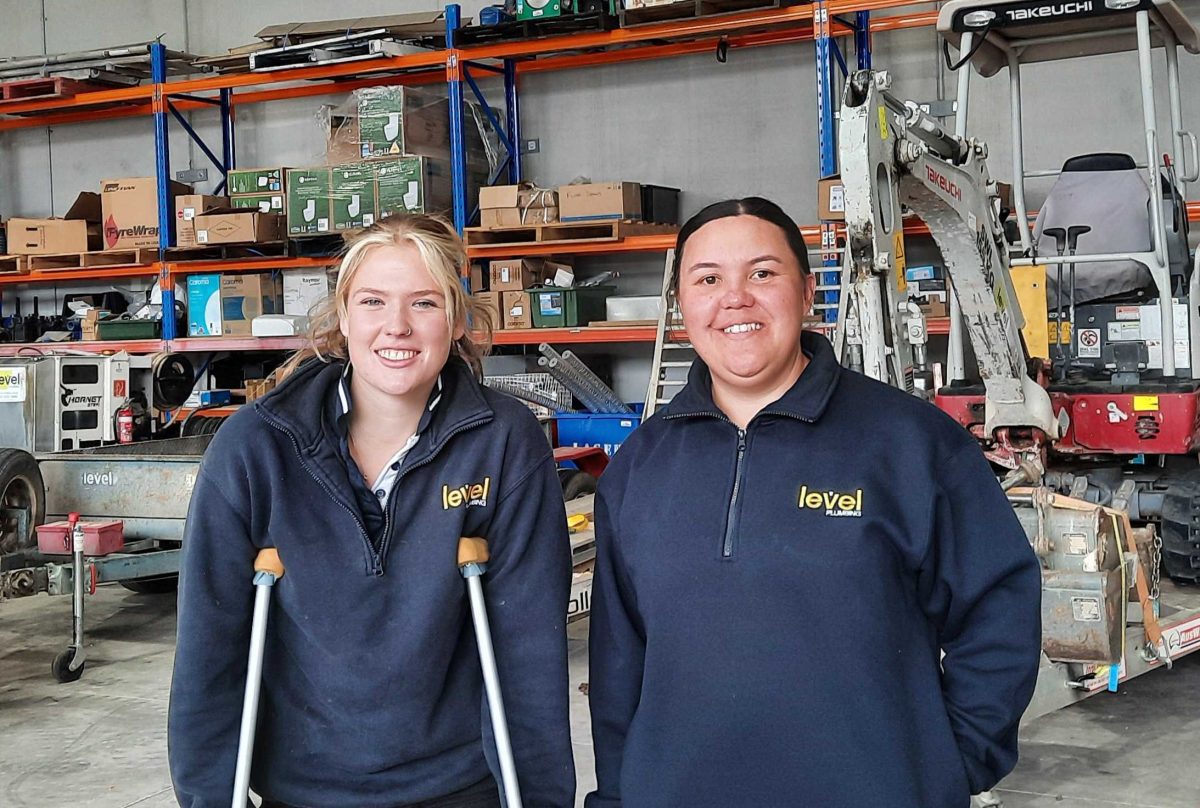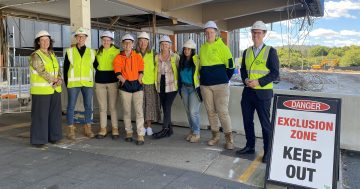
For plumbing apprentices Riley Barton and Ashley Condon, the extra payments will come in handy. Photo: Ian Bushnell.
ACT Labor has promised to support the tradespeople of the future who will deliver the thousands of new homes the ACT needs with an $8 million package that includes beefing up training subsidies and extra cost-of-living support.
In 2025, apprentices and trainees will receive a further $250 cost-of-living payment as well as an additional $250 tools and equipment grant.
About 5700 local apprentices and trainees last week received a $250 cost-of-living payment from the ACT Government for 2024, recognising the financial pressure many of them are currently facing as they undertake their study.
A re-elected Labor Government will also increase training subsidies to 90 per cent for apprentices and trainees in critical skills areas including plumbing, carpentry, bricklaying, air conditioning, landscape construction and more.
This is expected to support about 1500 apprentices and trainees in its first year and grow over four years.
Tertiary Education Minister Chris Steel said the training subsidy would be boosted by about $3000 across 20 qualifications such as carpentry, plumbing, bricklaying, refrigeration and air conditioning, key trades that were needed to support Labor’s plan to support the construction of 30,000 new homes.
Training subsidies would also be increased to 75 per cent across a range of other qualifications such as early childhood learning and hospitality.
Mr Steel said boosting housing supply wasn’t just about releasing new land, “it also has to be about addressing the critical skills needs in the construction industry”.
“We’re going to need thousands of new apprentices and trainees in the key trades that will assist us to build these new homes, whether it’s small home builders right through to large multi-unit dwellings, we’re going to need all of the skills needed,” he said.
Mr Steel said these supports should also help employers to take on more apprentices and encourage young people to consider careers in the building industry and other sectors rather than a university course.
He said the measures were the result of a review of training subsidies and followed the establishment last year of the National Skills Agreement.
“We’ve been working with industry to develop a series of skills industry action plans across sectors like the construction sector,” he said.
“This will deliver on a key element of that plan of reviewing the subsidy system.”
Master Plumbers CEO Shane Martin said there were about 54 per cent fewer people entering some of these key trades, including plumbing which was going to play an integral role in delivering new housing “because homes need pipes”.
“These kinds of initiatives are going to be important as we fight to keep up with the growing population and build those homes for the future,” he said.
Mr Martin said young people could not only look to a great career in a trade like plumbing but also the opportunity to set up their own business.
For plumbing apprentices like Riley Barton and Asley Condon, the $250 payments and training subsidies are very welcome in today’s tight economy.
Riley has been away from home since she was 16 and surviving on apprentice wages has been challenging.
Even now as a third-year apprentice with a little more money in her pocket the rising cost of living is taking a toll.
“You have to really budget, and I have my difficult weeks, especially living out of home,” she said.
The two young women are working in a traditionally male domain but have felt supported in the trade despite being outnumbered.
“A lot has changed for women,” said Ashley. “So, yeah, it’s been really nice to see the support of all the guys.”
Riley got a taste for plumbing on work experience as a student, and she just clicked with the trade.
“You need to think about what you’re doing and it involves quite a bit of problem solving as well,” she said. “So, yeah I just enjoyed it.”





















